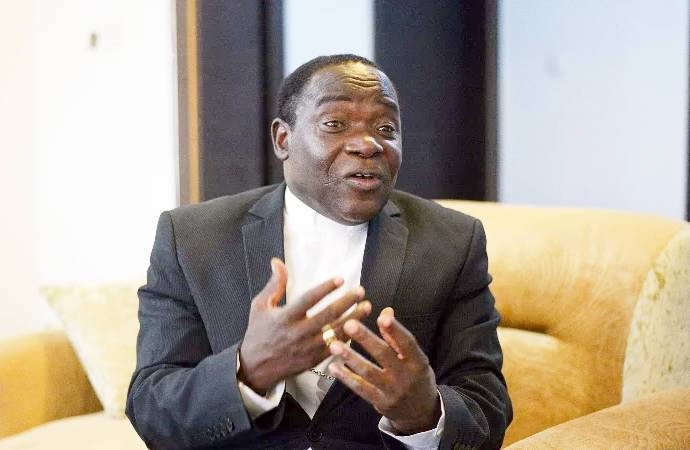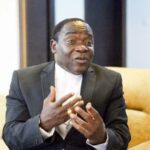This week, the major controversy in the country has been Bishop Kukah’s Christmas message for 2020, which has divided the country right down the middle. While one side says the message is appropriate and he is keeping to his tradition of telling truth to power, the other feels strongly that the message is from a bigot that has committed sedition against his country and should be arrested and jailed. The problem with the divide is that it follows Nigeria’s religious faultline with his supporters coming largely from the Christian community and the accusers from the Muslim community. This is a sad situation because what it tells us is the difficulty of an objective assessment of the Bishop.
Bishop Kukah is a good friend of mine that I have related with over the decades. I know him to be very committed to advancing the cause of the Nigerian nation and to have no ill will towards any religious group. He is somebody who will always say what he thinks in a clear and often confrontational manner and his area of academic interest cannot but draw him into controversy in a permanent manner and that has been the situation since the 1980s when he was writing his “Mustard Seed” column in the New Nigerian.
- 2021: Experts worry over low IGR as states budget N8.3tr
- 10 solid reasons why Nigeria’s 2021 budget should be trashed
His doctoral thesis at SOAS in London was on the theme of “Religion, Power and Politics in Northern Nigeria” and this theme has been the essence of Northern politics and maybe precisely because of that very contentious. In the two decades before independence, the distribution of power in Northern Nigeria was largely in the hands of the Emirate system leading to contestation by the Northern Christian community organised in the Non-Muslim League and subsequently the United Middle Belt Congress. A lot of the agitations of the time were submitted to the Willinks Commission of Inquiry in 1958 with demands for the creation of the Middle Belt, which the British rejected. In his academic work and writings, Bishop Kukah has taken on the mantle of this advocacy and very few in the North are neutral on the issue, so over the years, people have lined up for or against Kukah. For his part, the Bishop has been proud to take up the mantle of port parole for one side in this debate and in this context gets a lot of the bullets flying in relation to the theme. I do not think Bishop Kukah sets out to be controversial, it is just that his area of interest and commitment has been controversial over the past 80 years so he finds himself in the centre. As a Nigerian citizen and political scientist, he cannot really be queried for engaging in such a contentious subject but others might say that as a Bishop, he should leave the field to others and seek for less divisive issues.
As he has been mired in controversy for decades, people have made up their minds about him and I suspect many do not read what he writes but jump to conclusions on the basis of headlines. I saw many reactions to his Christmas message claiming that he had called for a coup against President Buhari. What he said actually was that: “Every honest Nigerian knows that there is no way any non-Northern Muslim President could have done a fraction of what President Buhari has done by his nepotism and gotten away with it. There would have been a military coup a long time ago or we would have been at war.” This is an assessment of possible hypothetical outcomes he is making and not a call for a coup. I think this statement is wrong and should not have been made. First, on the empirical level, the Goodluck Jonathan Government was generally considered to have been as nepotistic and no coup against it happened. Secondly, Nigerians have suffered from almost 30 years of military rule and any suggestion of a possible coup could be read as an invitation for one and should be avoided by democrats.
A lot of the opposition to Bishop Kukah is based on the reading that he is not just partisan on the Christian/Muslim divide but also on the party-political front. Some of the people I have discussed with point out that he was neither critical of the Obasanjo nor Jonathan Governments and that the virulence of his attacks on the Buhari Government is exceptionally high. For example, Bishop Kukah, speaking at a lecture organised by the members of the Pyrates Confraternity to mark the 80th Birthday anniversary of Nigeria’s Nobel Laureate, Professor Wole Soyinka in 2014 complained that: “Nigerians love to criticise their country perhaps far more than any nation I know of in the world. Yes, we have all earned the right to be cynical and even contemptible about the way we have been governed, and about how the resources of our nation have been frittered away mindlessly.” He added that: “…The President and the security agencies have become the objects of attacks and vilification and yet, there is very little that is being done to point at the way forward. I know that as day follows night, we shall pull out of this tragedy that we face as a nation. But the least we can do is to stand in the comforts of highways and homes that someone else constructed and thrown stones at ourselves and our people simply because we are living off someone else’s sweat.” The reality is that this language of understanding he offered to the Jonathan Administration he does not offer to his successor Buhari. It is, therefore, legitimate to accuse him of political partisanship in this regard. My good friend the Bishop, therefore, needs to reflect on his own relationships with previous governments and assess the validity of the claims of partisanship.
Much of the text of his Christmas message is a blunt attack about the nepotism of the Buhari Administration. The Bishop is right when he points out that increasingly, the people of Northern Nigeria, Muslim leaders inclusive, have been coming out to criticise the government: “For a long time, beyond the pall of politics, very prominent northerners with a conscience have raised the red flag, pointing out the consequences of President Buhari’s nepotism on national cohesion and trust. With time, as hunger, poverty, insecurity engulfed the north, the President’s own supporters began to despair and lament about the state of their collective degradation. Was this not supposed to be their song? The north that the President sought to privilege has become a cauldron of pain and a valley of dry bones. Today, the north itself is crying the most and why not? No one has suffered as much as they have and continue to. The helplessness is palpable and the logic is incomprehensible.” This message was, however, lost because many see the Lord Bishop as a partisan himself. The messages of hope interspersed in the speech were, therefore, largely lost except to his fan club.
Bishop Kukah is a very intelligent and sincere man and should spend time this Christmas season to reflect on how he could most effectively articulate his message so that less noise is created and more people are able to accept to actually read what he writes and engage with him in a manner that can promote greater understanding.



